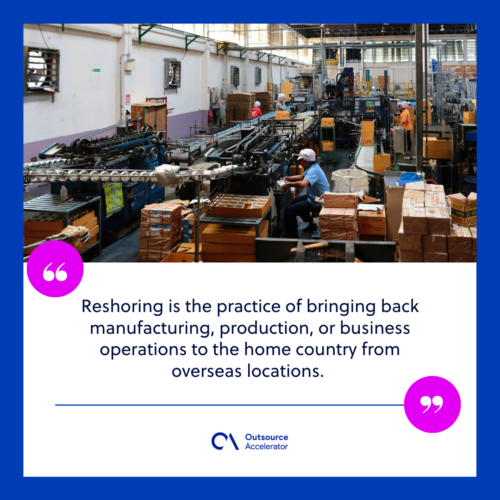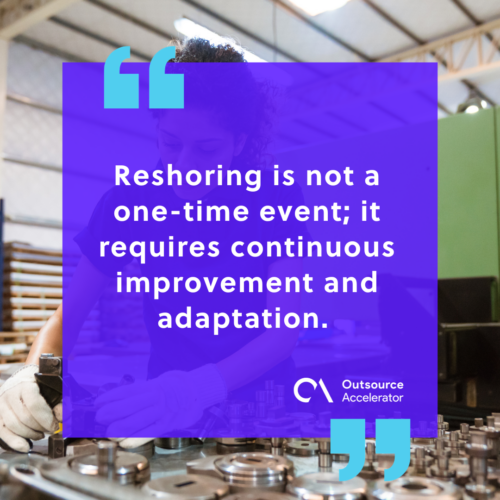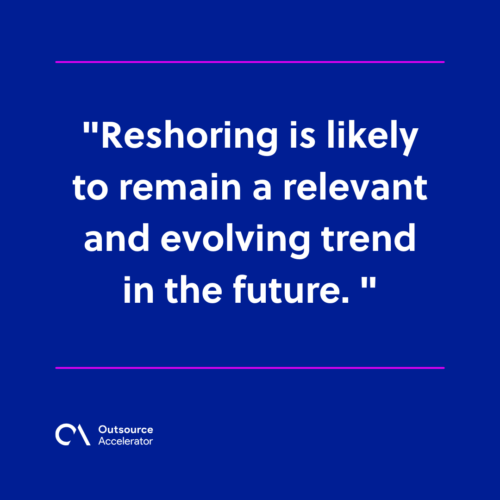Reshoring and how it affects your company

In recent years, reshoring has become a popular topic of discussion among business leaders and economists alike.
Reshoring represents a strategic paradigm shift for businesses worldwide. As the act of bringing manufacturing and services back to one’s home country, it also brings a deliberate reevaluation of the traditional offshoring model.
As organizations reassess the risks and benefits associated with dispersed production, the dynamics of the global marketplace are transforming.
This article delves into those nuances. We’ll explore the concept of reshoring, how it works, and its current impact on your business.
What is reshoring?
Reshoring is the practice of bringing back manufacturing, production, or business operations to the home country from overseas locations. These processes would have been previously outsourced or offshored.
This strategic shift is often motivated by a reassessment of the economic, logistical, and operational considerations that initially led to outsourcing or offshoring.
Essentially, reshoring represents a deliberate effort by businesses to re-establish or strengthen their domestic presence. Through this method, they aim to achieve greater control, efficiency, and competitiveness.

How does reshoring work?
The process of reshoring is intricate and involves several steps:
Assessment and analysis
Businesses initiate reshoring by conducting a comprehensive assessment of the factors that led to offshoring in the first place.
This involves evaluating the economic landscape and considering labor costs, transportation expenses, and regulatory environments.
Cost-benefit analysis
Companies perform a detailed cost-benefit analysis to compare the advantages and disadvantages of reshoring.
This analysis typically includes considerations such as:
- Labor costs
- Shipping expenses
- Taxes
- Tariffs
- Overall impact on the bottom line
Operational planning
Once the decision to reshore is made, businesses engage in meticulous operational planning.
This includes setting up or reconfiguring facilities, securing necessary permits and certifications, and developing strategies for workforce recruitment and training.
Supply chain management
Reshoring often necessitates adjustments to supply chain dynamics. Companies may need to identify new suppliers or re-establish relationships with domestic partners to ensure a smooth flow of materials and components.
Technology and automation
Businesses may invest in advanced technologies and automation to enhance efficiency and offset potentially higher labor costs in the home country. This can lead to increased productivity and competitiveness.
Government and regulatory considerations
Companies engaging in reshoring may collaborate with government agencies.
This helps navigate regulatory requirements, tax incentives, and other supportive measures designed to facilitate the relocation of operations.
Workforce transition
Managing the transition of the workforce is crucial during reshoring. This involves hiring, training, and possibly retraining employees to meet the specific needs of the reshored operations.
Quality control and standards
Maintaining or improving product quality is a key objective of reshoring. Companies often emphasize stringent quality control measures and compliance with industry standards.
Marketing and communication
As part of the reshoring strategy, companies may communicate the move to their stakeholders, customers, and the public. Emphasizing the benefits of reshoring, such as supporting local economies and ensuring product quality, can be integral to this process.
Continuous improvement
Reshoring is not a one-time event; it requires continuous improvement and adaptation. Companies regularly assess and refine their reshoring strategies to stay competitive and responsive to changing market conditions.
Ultimately, the success of reshoring depends on careful planning, adaptability, and the ability to leverage the unique advantages offered by domestic operations.

Benefits of reshoring on your business
Reshoring can offer a multitude of benefits to businesses, influencing various aspects of operations.
Some of these benefits include:
Potential cost savings
While it may appear counterintuitive, reshoring can sometimes result in cost savings for businesses.
Reduced transportation expenses, lower logistics costs, and a potential decrease in overall production expenses can contribute to this.
Quality control
Bringing manufacturing or operations back home allows for greater control over product quality. Closer proximity makes monitoring and managing the manufacturing process easier, reducing the risk of quality issues and product defects.
This can result in improved customer satisfaction, increased brand reputation, and reduced costs related to recalls or returns.
Faster response times
Being geographically closer to the market allows companies to respond more quickly to customer demands and market changes. Shorter lead times facilitate faster delivery and reduced time-to-market.
This agility is especially beneficial in industries where rapid product development and delivery are critical.
Job creation and talent development
Reshoring often leads to creating new jobs in the company’s home country. This can have positive effects on local communities, helping to stimulate growth, reduce unemployment rates, and support communities.
Furthermore, reshoring encourages the development of a skilled workforce. Companies invest in training and upskilling employees to meet the demands of localized manufacturing operations.
Supply chain resilience
A disruption in one region can impact businesses worldwide, highlighting the vulnerability of complex global supply chains. Reshoring can enhance resilience by lowering dependence on distant suppliers and lessening exposure to geopolitical risks.
Note that the benefits of reshoring will vary depending on the specific industry, market conditions, and individual company circumstances.
Disadvantages of reshoring
While reshoring offers numerous advantages, it’s important to also acknowledge the potential challenges that businesses may encounter during the process.
Here are some common disadvantages of reshoring:
Capital investment
Reshoring often requires significant capital investment to establish or reopen facilities, purchase new equipment, and train employees.
These upfront costs can be a barrier for businesses considering reshoring, especially those with limited resources.
Higher labor costs
Reshoring production to a higher-cost home country can result in increased labor expenses compared to offshore locations with lower wages.
It can impact the overall cost competitiveness of products and potentially reduce profit margins.
Limited skill availability
Reshoring may face challenges in finding workers with the necessary skills and expertise, especially if certain skills had previously been outsourced.
Companies may need to invest in training programs or educational partnerships to bridge the skills gap.
Disruptions and transition challenges
Transitioning from offshore production to reshoring can involve logistical challenges and disruptions in the supply chain. It may take time to ensure a smooth production transition, which can result in temporary inefficiencies and additional costs.
Market dynamics
The decision to reshore should consider market demand and viability. If the target market for the products or services is primarily overseas, reshoring may not provide a significant advantage.
It also limits a company’s ability to tap into diverse customer bases and strike at specific market conditions in different regions.
Trade and regulatory complexities
Reshoring may be subject to trade regulations, tariffs, and compliance requirements that can add complexity and costs to business operations.
Understanding and complying with these regulations is essential.
Reshoring as a new trend in manufacturing
Offshoring was once seen as the go-to strategy, mostly for cost savings. However, the challenges associated with it have prompted many companies to reconsider their manufacturing footprint.
Still, we’ve seen that while reshoring presents notable advantages, it’s not without its own challenges. Businesses need to conduct thorough analyses and weigh the potential benefits against the disadvantages.
Reshoring is likely to remain a relevant and evolving trend in the future.

Companies that adopt a holistic and strategic approach to reshoring can position themselves for long-term success by balancing cost efficiencies, quality control, and market responsiveness.







 Independent
Independent




